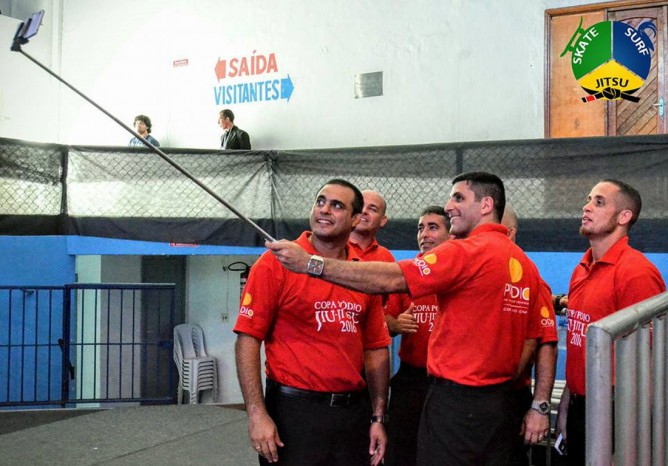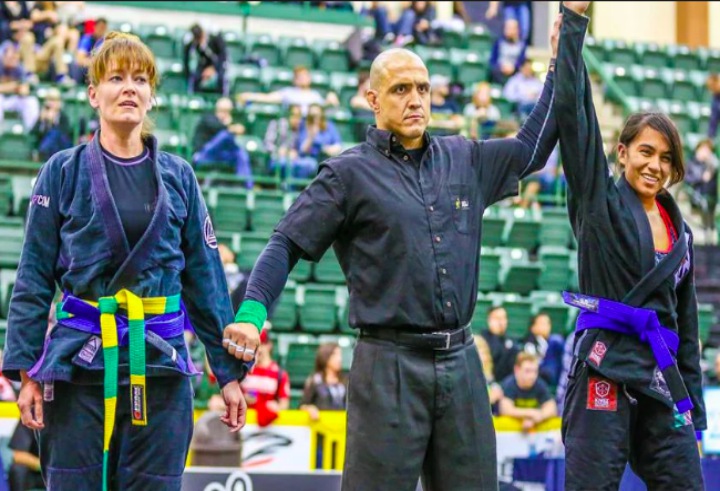As someone tasked with staffing tournaments, I can tell you I’m observing a shortage of qualified grappling referees. The reason for this shortage is not difficult to understand – more tournaments in more places, more often. In reviewing the U.S. calendar for grappling events in February 2018, I counted more than 20 events around the country. I think it’s time for the grappling community to consider the recruiting, training, and hiring of dedicated individuals interested in officiating.
There are actually a lot of positive reasons to want to be a referee. But often, the negatives are much easier to imagine than the positives, and this can prevent interested individuals from even pursuing the job. This author will attempt to provide a practical overview of the job of referee, and hope that it helps persuade the next generation of referees to give it a go.
The Challenges
I’ve often said that becoming a competent referee is a lot like a jiu jitsu journey itself. Everyone starts out in the same place with little or no knowledge – they must learn and practice for a long time, and then arrive at a place of competence and confidence. If enough experience occurs over a long period of time, then they may even find expertise. This is not unlike the journey from white to black belt, so frankly it has to be thought of in similar terms.
The first challenge is getting started. There are no ‘referee schools’, and frankly, most referee courses are rules discussions and only encompass part of the job. For my own referee journey, I latched on early to mentors who had a high level of understanding of the job, and let them guide me. I went to tournaments often early on, I spectated and observed, I took rules courses, and I experienced competition myself. In fact, a negative tournament experience with a referee ultimately inspired me to become one ( See my match here https://youtu.be/rJsFi0HlPYo ). Additionally, I was willing to travel at my own expense and invested time and money to learn the craft from wherever I could.
But after getting started, refereeing remains like jiu jitsu – you can’t get good without constant practice, and even when you become competent, your skills fade with inactivity. This means to become and remain competent, there is a level of dedication that is required if you’re serious. You can’t dabble – if you want to referee once a year, don’t bother. If you’re going to a tournament to coach or compete, don’t think you should just ‘referee also’ while you’re there. You won’t be good, and you won’t offer value to tournaments looking for competent people. The best referees work at least every month, sometimes week after week. If you’re serious, you have to make the same level of commitment you did to training – every week, month after month, year after year.
Typically, you have to be willing to travel extensively to learn and work as a referee. Unless you’re fortunate enough to be located in a grappling hub city like San Diego, CA, you probably have to travel around your state, neighboring states, or even across the country. This costs time and money, some of which is at your expense and you will not recoup. Consider just the travel time across the country to work a tournament, and you likely will burn an entire weekend away from friends and loved ones.

The most obvious pitfall bestowed on refereeing is the notion it is a stressful, thankless job. In the beginning, the stress is highest because it’s really trial-by-fire. You will not get much guidance or education, and the criticism for any shortcomings in your performance can be swift and vicious. This is an inevitable growing pain that has to be fought through to come out on the other side as confident. Despite this reality, these negatives certainly do not fairly encompass the job as a whole. There are many jobs out there in different industries that require dealing with upset, rude, or disrespectful people, and you have to evaluate the pros and cons of such a role before pursuing it. So let me help by also outlining the long list of positives for consideration.
The Rewards
Perhaps the biggest reward of being a referee is that it is the quintessential extension of the jiu jitsu lifestyle. Do you love jiu jitsu? Check. Do you like meeting and working with other people who love jiu jitsu? Check. Do you like to get paid for doing things related to jiu jitsu? Check. Would you like to be paid to travel to do jiu jitsu? Check. Clearly if you’ve committed yourself to ‘the lifestyle’, there are a ton of things that can positively impact your journey. I’ve met some of the coolest people from my travels around the country as a referee – something I am thankful for.
Now understand, refereeing is a job first and foremost. You have to be reliable, come prepared, follow instructions, and work hard. But for that, you can be rewarded quite handsomely. Typically, referees earn from $200-$350 a day, roughly $20-30/hour, often plus expenses. I’ve traveled the country to cities I might never have visited thanks to the job, and got paid doing it – not a bad deal, right?
Refereeing actually is interwoven with and a natural extension of training as well. It is necessary to have a strong understanding of actions, positions, and strategies before you can appropriately apply rules around that foundation. This foundation is why referees are usually encouraged to start at purple belt level and not sooner. We often hear the term ‘1%’ when referring to those practitioners who actually make it to black belt. Well if you consider the referee community, the percentage is far, far smaller than that, and puts you in very elite company. If you want to be separated from the pack, becoming a referee definitely puts you in unique standing amongst your peers.
Additionally, consider being a referee as a supplement to the physical training that you get at your school/academy. If you’ve spent even a dollar on a grappling DVD or spent time on YouTube watching videos of matches to pick up a thing or two, imagine the benefit of exposure to hour after hour of quality ( and not so quality ) grappling live and in person.. Couple that with fairly direct access to the highest level of coaches and competitors, and you can learn a lot while on the job. And jiu jitsu education aside, if you like watching competitive grappling, it’s the best seat in the house.
Lastly, a popular expression today is ‘pay it forward’. Well if you’re on a jiu jitsu journey, and people have helped you progress and make it a positive in your life, how can you pay it forward? A referee has the opportunity to offer a quality experience to competitors, young and old, new and experienced. You can help educate others about competition, share your enthusiasm about the sport with others, help a tournament organization succeed, and help grow the sport – and get paid to do so.
So I hope I have fairly characterized the pros and cons necessary to evaluate whether becoming a referee is right for you. I assure you, it is not right for everyone, no matter what your skills, inspiration, or goals are. For some, it is simply not a good fit. But if you’re not shy, have a bit of courage and confidence, and a passion for the sport, it just might be right for you.
Author David ‘Silverfox’ Karchmer was awarded his black belt in Brazilian Jiu Jitsu in June 2012 and has been training for more than 18 years. In addition to training and instructing, David has focused the last eight years on officiating grappling competitions and has officiated more than 3,500 gi and no-gi matches at over 79 events for multiple organizations. He was a previous head referee at Grapplers Quest, has held/holds head referee duties at Tap Cancer Out, FIVE Grappling, UAEJJF New York Open, Copa NoVA, and Rollmore SuperComp tournaments, and routinely officiates events in North America. For more about David, go to: www.thegrapplingreferee.com

















